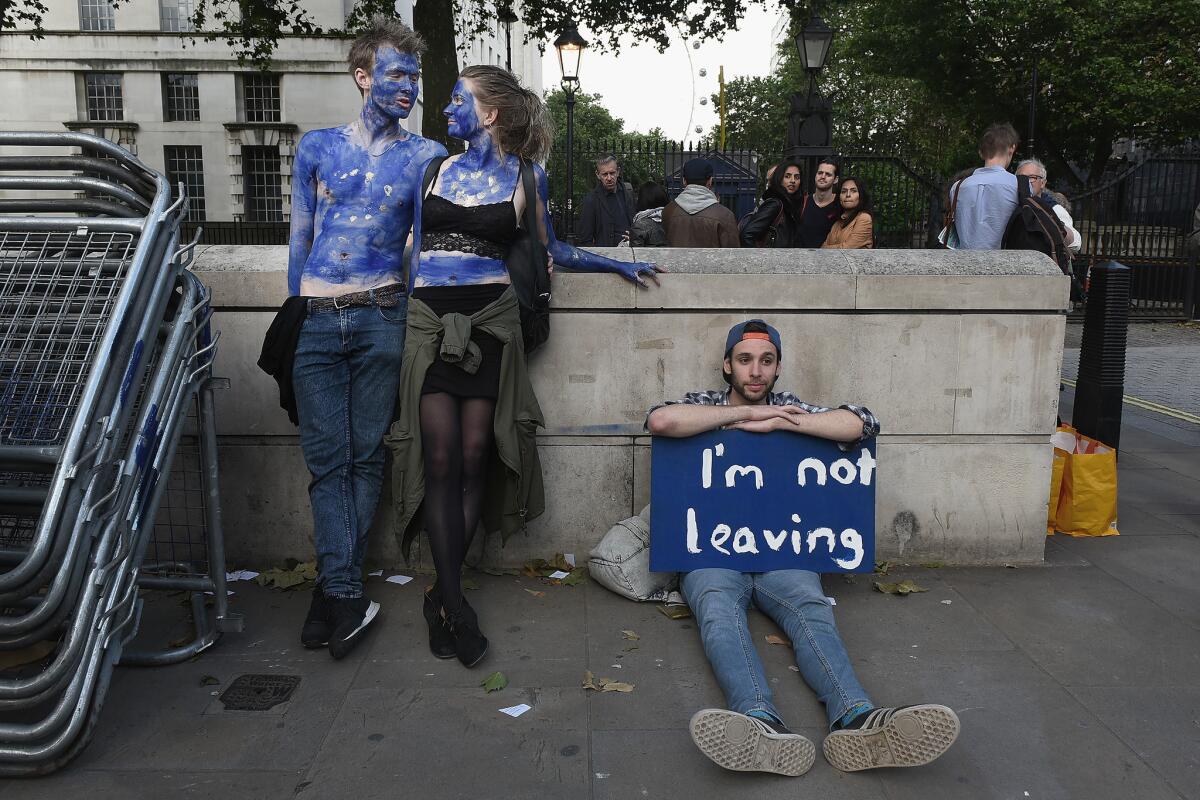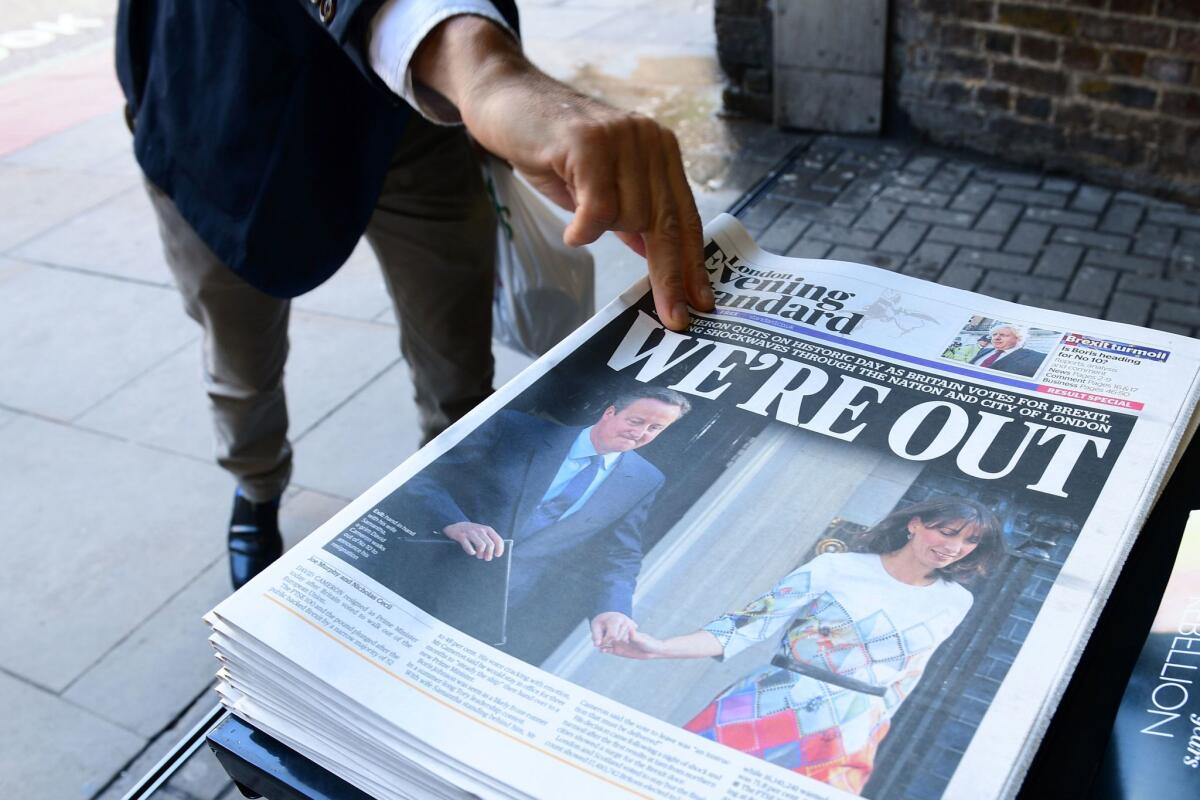The British establishment didn’t think ‘Brexit’ could win, but it did. Here’s why.

Great Britain’s decision to leave the European Union has sent shock waves around the world. Early polls had indicated that the camp pushing to remain in the EU would likely succeed, even by a small margin. But in what was the highest turnout for a British-wide vote since the general election of 1992, a majority of British voters decided it was time to end a political and economic relationship 43 years in the making.
So what went wrong for those who wanted to remain?
The positive message got lost
Britons have always had a level of Euro-skepticism and those campaigning to remain in the European Union simply failed to push the positive, experts said.
“The whole ‘remain’ campaign got mired in the negative,” said Nicholas Cull, a professor of public diplomacy at USC. “But it’s bigger than the campaign. In terms of public diplomacy, the European Union failed to communicate and did not do enough to remind us of the European Dream. The European Dream was about learning to work together and about celebrating our differences, and about moving forward in peace, and about being better because our connections.”
The remain camp failed to drive home its message that Britain would be “stronger, safer and better off in Europe” than on its own, analysts said.
“Even though people may feel like they are suffering, the fact is that they have done remarkably well belonging” to the EU, said Dominic Thomas, chair of the department of French and Francophone Studies at UCLA, who works on European immigration issues.

The remain camp failed to counter anti-immigration sentiment
Many Britons have expressed frustration over benefits awarded to citizens of other EU countries living in Britain, such as access to jobs and housing. They blame immigrants from eastern and southern Europe for making it more difficult to find housing, for undercutting wages, and for the longer waits for services such as healthcare. There is also anxiety over having to accept some of the recent flood of migrants to Europe from Syria, Afghanistan and Africa, and fear that Britain risks importing terrorists.
Leaders of the far right insisted that immigration would “continue out of control” if Britain remained in the EU and the country’s national health service would continue to feel the strain.
“The ‘leave’ camp was organized around fear of immigration, Islam, globalization, China,” Thomas said. “The other side found themselves on the defensive trying to counter the argument of fear. It’s very difficult to challenge people’s fears. There is deep-seated racism in this debate that gets cloaked in national identity.”
Proponents of leaving Europe exploited the immigration issue “in quite a cynical way,” Cull said.
“They were pushing particular buttons,” he said. “They knew the button that would get people wound up.”
Distaste for Big Brother Brussels
The remain campaign underestimated the dissatisfaction over what was viewed by many Britons as efforts by the EU to dilute the authority of individual member states and consolidate power in Brussels, especially because British voters could not hold the European Commission — the EU’s executive branch — to account for any of its actions.
“If anything was underestimated, it is the depth of the populism that exists in the U.K. and across Europe and the United States,” said Christopher Chivvis, associate director of Rand Corp.’s International Security and Defense Policy Center. “There is evidence that the popular sentiment linked to ongoing financial crises is much deeper and more serious than people have recognized.”
Complacency settled in, thanks to the polls
Those campaigning to remain put their money on the polls being right, experts said. All indications early on were that Britain would remain in the EU. So the campaign vigor for those wanting to remain abated in comparison with those seeking to exit, experts said.
“People for exit were far more mobilized to go and vote than those who wanted to remain,” Thomas said.
See the most-read stories this hour »
Honesty, or dishonesty, also played a role. Many people polled in regions that were expected to vote to remain in the EU might have been reluctant to speak truthfully, for fear of being viewed as anti-immigrant or racist, some experts said.
The older generation
The remain campaign was rejected by older Britons. Among voters ages 50 to 64,a majority of 56% chose to leave the EU, according to British media reports, and 61% of those 65 years and older voted for Britain to part ways.
The Boris Johnson effect
The popular political heavyweight and former mayor of London gave a huge boost to the leave campaign, according to British media reports. Articulate and media-savvy, his “personal popularity seemingly across many different sections of society may also have made a difference as he crisscrossed the country in a battle bus selling a better Britain outside of the EU,” the Guardian reported.
MORE BREXIT NEWS
Investment managers ponder the ‘Brexit’ vote; one calls it evidence of ‘a bear market in confidence’
‘Brexit’ means traveling to the U.K. will likely be much cheaper this summer
Stock market plunges but ‘Brexit’ unlikely to spark a U.S. recession
Will the ‘Brexit’ mark the end of the age of globalization?
More to Read
Sign up for Essential California
The most important California stories and recommendations in your inbox every morning.
You may occasionally receive promotional content from the Los Angeles Times.











